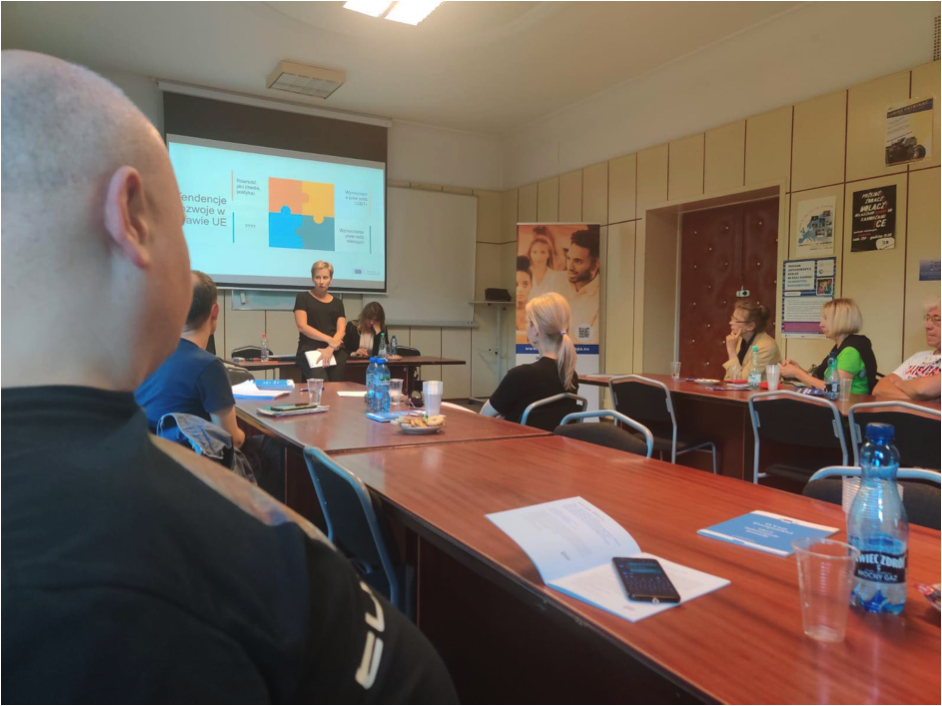“European” May in Poland: 20th EU Membership Anniversary and Parliamentary Elections Preparations
Centrum Europejskie UW page on Facebook - Marta Pachocka speaking about EU migration policy at the ‘Quo Vadis Europe’ meeting
May 1, 2024 marked the 20th anniversary of Poland's membership to the EU. On this occasion, numerous scientific, expert, and open events were devoted to summarising Poland's presence in European structures, discussing its future role, and looking at the challenges facing Poland and the EU. All this is compounded by preparations for the European Parliament elections to be held in Poland on June 9, 2024. Preparations are also slowly underway for the Polish Presidency of the EU Council in the first half of 2025.
On this occasion, Marta Pachocka from the Horizon Europe GAPs team at CMR UW, who is also a Team Europe Direct expert at the European Commission in Poland, participated in numerous events in May. She spoke about the migration situation in Poland and its neighbourhood and on migration management in the EU, including in the context of the recently adopted New Pact on Migration and Asylum.
On May 9, 2024, Marta commented as a panellist on the results of the qualitative and quantitative research of the Centre for Public Opinion Research (pol. CBOS) on Poland's 20 years in the EU from the point of view of migration processes and migration policy, which CBOS presented at SGH Warsaw School of Economics during the seminar ‘From Euroenthusiasm to Eurorealism - how our attitude towards the European Union has changed. Challenges for the future’.
On May 14, Marta participated as a migration expert in a closed seminar entitled ‘The European Union in the Face of Treaty Reforms and Prospects for Enlargement’ organised by the Lublin-based Central Europe Institute at the EP Office in Warsaw, where she raised the issues of EU migration policy, the Pact and the possible revision of treaties to improve migration management at EU level.
On May 15, Marta moderated a panel entitled ‘European societies in times of contemporary challenges’ at ‘Political, economic and social changes in the European Union: challenges and prospects for Poland’ conference, to mark the 20th anniversary of Poland's membership in the European Union. In her introduction and summary of the session, she noted the importance of migration governance issues for Poland and Europe, bearing in mind, among other things, the risks associated with the unstable security situation in the Central and Eastern Europe region. It was one of the most important scientific conferences of EU studies representatives from all over Poland, organised at the University of Warsaw in cooperation with the Polish European Community Studies Association (pol. PECSA) and the Polish Society for European Studies (pol. PTSE), under the honorary patronage of the Rector of the University of Warsaw and the European Commission in Poland.
On May 16 and 17, the think tank Sobieski Institute organized an international conference on the occasion of Poland's 20th anniversary in the European Union, and the project ‘Academy of Young Experts’ was summarised. Marta spoke as a migration expert both in the discussion panel on Poland's contemporary challenges in the EU and in a panel discussion with young people using the open space method on the ‘European migration policy’ during which she answered their questions on EU policy, the Pact, the future and Poland.
On May 21, the meeting ‘Quo Vadis Europe’ was organized within the framework of the European Commission project ‘Stopover Europe’ addressed to the general public (participants of the University of the Third Age, students, youth, etc.) at the Centre for Europe of the University of Warsaw. Marta spoke about EU migration policy, presenting the migration situation in the EU and its neighbourhood, including voluntary and forced migration, as well as returns, and discussed the state of affairs in the area of EU policy and future challenges.
Contact:

